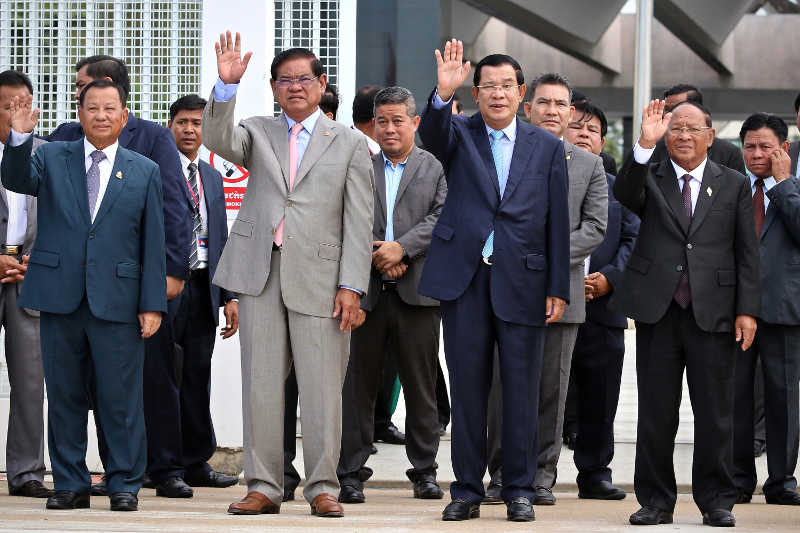Opposition party members will be investigated for attempting to stage a color revolution, Interior Ministry spokesman Khieu Sopheak told a local newspaper on Tuesday, in what one political analyst described as a move to “clear the deck” of obstacles in the way of a CPP national election victory next year.
The CNRP denied the allegations.

Separately, Interior Minister Sar Kheng announced on Tuesday that nine inactive political parties would be dissolved for failing to submit required documentation to the ministry.
Meanwhile, Cambodia’s Mission to the U.N. in Geneva on Monday refuted criticism by the U.N.’s Office of the High Commissioner for Human Rights (OHCHR) that the government was selectively targeting independent media and NGOs ahead of next year’s elections. The mission claimed the state’s actions were simple law enforcement.
Following a frenzied purge on independent media and targeting of NGOs, Tuesday’s announcement from the Interior Ministry would appear to suggest that the government is now turning its attention toward the CNRP.
Speaking to government-friendly newspaper Rasmei Kampuchea, General Sopheak said the ministry “will open an investigation into news releases that there is an organized network within the CNRP [intending] to wage color revolution to topple the CPP-led government.”
He did not elaborate on the plans and could not be reached for comment on Tuesday.
Carl Thayer, an emeritus professor at the University of New South Wales, said Prime Minister Hun Sen was eliminating perceived threats after a subpar showing in the June vote.
International attention has been flagging, and “this is the time to do it,” Mr. Thayer said.
“Take swift action now, clear the decks, and steamroll through it.”
In recent weeks, there has been a slew of Facebook leaks and allegations accusing U.S.-funded organizations, including democracy-promoting NGO the National Democratic Institute (NDI), of puppeteering alleged opposition attempts to overthrow the government using friendly media like Radio Free Asia (RFA) and Voice of America (VOA), all of which have been picked up by government-aligned news outlet Fresh News.
The Foreign Ministry ordered NDI closed and its foreign staff expelled last week for failing to comply with tax and registration requirements. All but two local radio stations carrying RFA and VOA have been forced off air or dropped the programming, while the independent Voice of Democracy was cut off by all stations.
Responding to the Interior Ministry’s threat of an investigation. CNRP Vice President Mu Sochua denied the existence of any effort to mount a color revolution within their ranks, and said the spokesman’s comments followed a familiar political cycle: a set of Fresh News leaks leading to a threat from Prime Minister Hun Sen, the announcement of an investigation, and the handing down of arrest warrants.
“Democracy is on the losing side,” she wrote in an email.
Controversial amendments to the Law on Political Parties passed earlier this year allow the Interior Ministry to suspend political parties, and the courts to dissolve them entirely, for a variety of vaguely-worded offenses, including involving convicts in party affairs.
On Tuesday, Mr. Kheng, the interior minister, said in a letter to the Supreme Court that the ministry was enforcing the law against nine political parties, none of which competed for seats in the June commune elections.
The parties, which include the Khmer Citizen Party, New Society Party and Light Freedom Party, failed to submit annual reports and other paperwork to the ministry, according to Mr. Kheng.
The Phnom Penh Municipal Court has already issued verdicts to halt the activities of four of the nine political parties, Mr. Kheng wrote, requesting that they now be dissolved by the Supreme Court.
The remaining cases are pending.
Meanwhile, over the past week, the OHCHR and other international observers have urged the government to show restraint and reconsider its rapid actions against media, including The Cambodia Daily, and NGOs.
But Cambodia’s mission to the U.N. panned the criticism as patronizing and based on “hearsay, unverified, and politically-motivated sources” in a statement.
“The government has a duty to enforce the law and regulation which is no different from other democratic societies’ practices,” the statement said.
“Cambodia is no longer in an infancy stage, we are adequately mature to [the] challenge and no longer expecting to be spoon-fed,” it added.
Mr. Thayer, the professor, said there was little likelihood that the U.S. or anyone else wanted revolution, but Mr. Hun Sen had never felt accepted by the West and saw its tacit support of the opposition as just the latest attempt to overthrow
him. To the prime minister, “Western advocacy of democracy is an overthrow of the one-party regime,” Mr. Thayer said. “To me it looks like he’s really trying to end the CNRP and atomize it.”



